- Resilient Virginia’s First Three Years
- Sea Level Rise Preparedness: An Intergovernmental Pilot Project as a Blueprint for Community Resiliency
- Drawdown: The Most Comprehensive Plan Ever Proposed to Reverse Global Warming
- KidWind Challenges: The Best Program You’ve Probably Never Heard Of!
- Don’t Just Talk About Backup Power From Your Electric Car — Make It Happen!
- Resilient Events Calendar
- Your Membership Counts!
What’s New
Resilient Virginia’s First Three Years and a Look Ahead
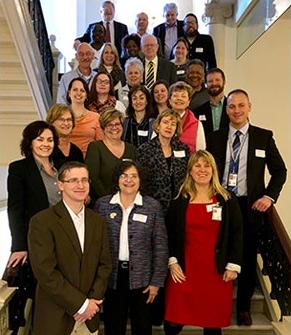 Three years have gone by rapidly since Resilient Virginia set out on its mission to accelerate resiliency planning in communities across the Commonwealth. We had an opportunity to give an overview of Resilient Virginia’s accomplishments at our February 2nd Virginia Sustainable Future Meeting. We appreciate the time and ideas that our expert guests contributed. We especially appreciate that Secretary of Agriculture and Forestry Bettina Ring and Secretary of Natural Resources Matt Strickler participated in the event.
Three years have gone by rapidly since Resilient Virginia set out on its mission to accelerate resiliency planning in communities across the Commonwealth. We had an opportunity to give an overview of Resilient Virginia’s accomplishments at our February 2nd Virginia Sustainable Future Meeting. We appreciate the time and ideas that our expert guests contributed. We especially appreciate that Secretary of Agriculture and Forestry Bettina Ring and Secretary of Natural Resources Matt Strickler participated in the event.
Priorities for the future highlighted at the meeting include:
- The need for a state-level resiliency framework under which to organize state, regional, and local policy and programs;
- The need for education and coalition building to foster the positive public will to support action on resiliency policies and programs;
- Investigating innovative financing mechanisms for infrastructure adaptation strategies;
- Establishing commonly accepted models for risk assessment and consistent standards for resiliency;
- Creating a clear business case for resiliency actions;
- Building an understanding of rural and urban interdependence;
- Fostering an understanding of the role of clean energy and resilient building design in providing solutions;
- Highlighting the role of healthy communities and attention to vulnerable populations as components of resilient communities.
Resilient Virginia will take these priorities into consideration as it creates its workplan for the next four years. We will explore expanded ways to assist communities in both urban and rural areas with understanding the need for resiliency planning and to help them access tools for adopting action plans.
You can assist Resilient Virginia in formulating and carrying out our third Resilient Virginia Conference and other new initiatives by becoming a member or sponsorand by joining our working committees. Contact Annette Osso, Managing Director, at osso@resilientvirginia.org.
Sea Level Rise Preparedness: An Intergovernmental Pilot Project as a Blueprint for Community Resiliency

Editor’s note: In 2014, a Hampton Roads initiative to learn more about and create solutions to sea level rise and flooding was initiated by public, private, and academic leaders in that community. We will share an overview of this initiative, along with the final report. In subsequent newsletters, we will focus attention on other parts of the state where community leaders are starting down the path toward resiliency. The author of this article, Rear Admiral Ann C. Phillips, US Navy (Retired), chaired the Infrastructure Working Group for the Hampton Roads Intergovernmental Pilot Project from 2014–2016. See highlights of the article in this newsletter and the complete article here.
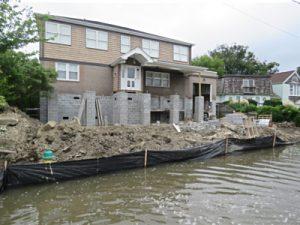 The Hampton Roads Sea Level Rise Preparedness and Resilience Intergovernmental Pilot Project (IPP) (convened by Old Dominion University and launched in June 2014) was one of four National Security Council pilots and three Department of Defense pilots established to prepare the United States for the impacts of a changing climate.
The Hampton Roads Sea Level Rise Preparedness and Resilience Intergovernmental Pilot Project (IPP) (convened by Old Dominion University and launched in June 2014) was one of four National Security Council pilots and three Department of Defense pilots established to prepare the United States for the impacts of a changing climate.
Hampton Roads localities (including Norfolk, Hampton, Newport News, Portsmouth, and Virginia Beach), four Cabinet Departments of Virginia Governor Terry McAuliffe, 11 Federal Agencies (including DOD, Army, Navy, Air Force), DHS (U.S. Coast Guard), DOT, DOE, Port of Virginia, VDOT, HRPDC, HRTPO, HRSD, and a variety of private businesses and non-profits worked together over two years to develop recommendations and strategies for cooperative resilience planning. Throughout the process, more than 200 regional professionals participated in voluntary working groups, committees, and stakeholder events.
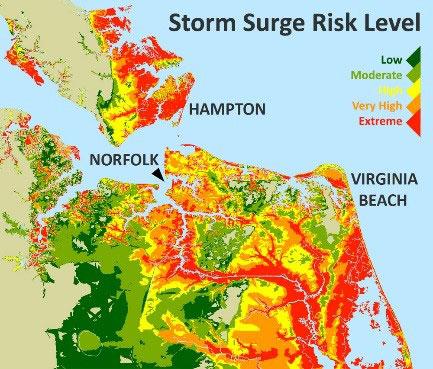
The IPP’s stated mission was that upon completion of the two-year effort, Hampton Roads would have a path to establish a regional Whole of Government and Whole of Community organizational framework, along with recommended procedures to effectively coordinate sea level rise preparedness and resilience planning for the region. Further, the IPP’s vision and the National Security Council’s objective included the development of this regional framework for Hampton Roads as a template that could be used for other regions.
Desired Outcomes: The Pilot Project identified five key desired outcomes to help Hampton Roads move forward in adapting to this challenge, shown here as synthesized from case studies and findings across the committees and working groups, and including lessons learned from South Florida, New Orleans, and the Netherlands. They are as follows:
- Develop and implement common Regional Planning Standards — including, but not limited to common first floor elevation/building codes/GIS attributes/sea level planning scenarios — to facilitate effective regional planning and execution of adaptation efforts.
- Establish support from a Consortium of Universities — ensure the best possible science, data, and engineering expertise from a non-partisan trusted agent.
- Establish a Regional Data Center — ensure an independent, centralized ability to collect, analyze, distribute, and respond to regional data needs.
- Ensure collaborative, prioritized planning and execution — create formalized relationships between Federal/State/Cities/Municipalities/Businesses/Non-profits and Citizens
- Identify funding strategies and create funding instruments for regional program needs — bring together and prioritize opportunities from multiple sources including federal, state, local government, private industry and non-profits.
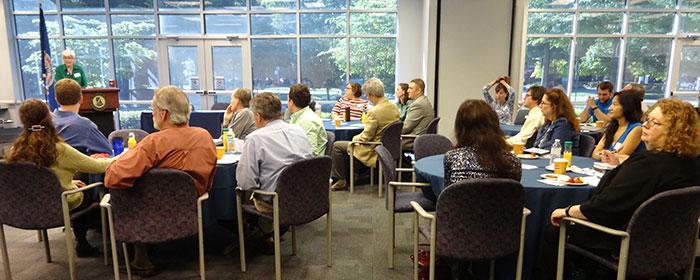 Community members learn about sea level rise from Michelle Covi, Assistant Professor of Practice, Ocean, Earth & Atmospheric Sciences, Old Dominion University.
Community members learn about sea level rise from Michelle Covi, Assistant Professor of Practice, Ocean, Earth & Atmospheric Sciences, Old Dominion University.
The Future: While there are actions and activities underway across the region at every level, the need for the regional collaboration and oversight entity identified by the IPP grows as water levels continue to rise and the land subsides. The IPP showed the tremendous value of regional partnerships working in collaboration across the whole of government and community. Now, it is up to Hampton Roads to seize this opportunity to take the lead in developing collaborative adaptation and mitigation strategies and actions to address to this existential threat — and we have no time to lose!
To view the entire IPP final report and case studies on line, visit ODU Digital Commons.
About the author: Rear Admiral Ann C. Phillips, US Navy (Retired) chaired the Infrastructure Working Group for the Hampton Roads Intergovernmental Pilot Project from 2014-2016. She is now a member of the Advisory Board for the Center for Climate and Security. The opinions expressed are her own.
 Drawdown: The Most Comprehensive Plan Ever Proposed to Reverse Global Warming
Drawdown: The Most Comprehensive Plan Ever Proposed to Reverse Global Warming
Paul Hawken, Executive Director of Project Drawdown and one of the fathers of the sustainability movement, presented an overview of a major new publication at the Champions of Change Sustainability Symposium, held January 8, 2018. The book, Drawdown: The Most Comprehensive Plan Ever Proposed to Reverse Global Warming, is the product of work conducted with over two hundred scholars, students, scientists, researchers, and activists who analyzed extensive data gathered from around the world. They produced what they consider the one hundred most substantive solutions than can cumulatively reverse global warming by reducing and sequestering greenhouse gases.
By “doing the math” and focusing on technological, ecological, and behavioral solutions, the research team produced their results. Top categories of solutions include those associated with food (changing production methods, reducing food waste, switching to plant-rich diets), electricity generation (ramping up wind and solar production), and land (including proper land management and reforestation).
 Thanks to GreenBuilder Media, the conference hosts, I am sharing both an article by CEO Sara Gutterman and Paul Hawken’s presentation here and on the Resilient Virginia YouTube channel.
Thanks to GreenBuilder Media, the conference hosts, I am sharing both an article by CEO Sara Gutterman and Paul Hawken’s presentation here and on the Resilient Virginia YouTube channel.
Farm photo courtesy of regenerationinternational.org; renewable energy photo courtesy of Financial Tribune.
 KidWind Challenge: The Best Program You’ve Probably Never Heard Of!
KidWind Challenge: The Best Program You’ve Probably Never Heard Of!
Kids from middle and high schools around Virginia will be showing off their knowledge about designing and building wind turbines again this year during March events that make up the 2018 KidWind Challenges. This program, hosted by the James Madison University Center for Wind Energy, has been an opportunity for children to “learn by doing” since 2012, and has involved over 1,300 students, coaches, judges, and volunteers and 170 schools.
The students are judged in three areas: 1) turbine performance, 2) turbine design quality and process, and 3) knowledge of the wind industry. The CWE hosts three regional qualifying KidWind Challenges:
- March 5 at the Science Museum of Western Virginia In Roanoke
- March 16 at the Steven F. Udvar-Hazy Center in Chantilly
- March 23 at the Nauticus in Norfolk
The top three teams in each Middle and High School division from each regional Challenge will be invited to compete in the National KidWind Challenge in Chicago, IL at the American Wind Energy Association Windpower Conference in May 2018.
See what Virginia students think about wind energy on our Clean Energy video playlist.
Kids from middle and high schools around Virginia will be showing off their knowledge about designing and building wind turbines again this year during March events that make up the 2018 KidWind Challenges.
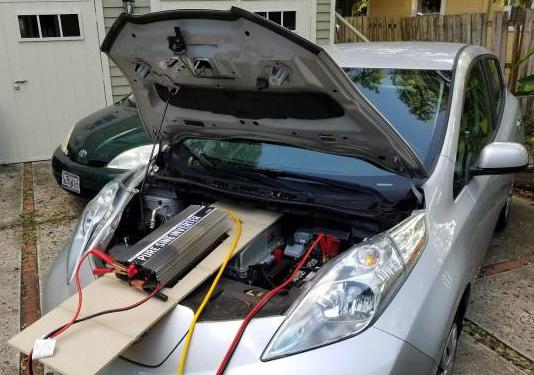 Don’t Just Talk About Backup Power From Your Electric Car — Make It Happen!
Don’t Just Talk About Backup Power From Your Electric Car — Make It Happen!
You may be considering how to make sure you have backup power in the event of some extreme weather, like 60 mile-per-hour winds that knock out power lines, as happened recently in the Commonwealth. A colleague, Charlie Behrens, whom I met at the Champions of Change Symposium, shared how he utilized the “big battery” in his driveway, i.e. his Nissan Leaf. He used some do-it-yourself expertise to successfully provide emergency power for his Orlando home during recent hurricane-induced power outages. Key ingredients, besides the car, were a 3000W Pure Sine Wave Inverter by Power Tech-On, a circuit breaker to prevent damage to the car’s system, and power cables.
Read the full account here.
— Annette Osso, Editor
Thanks to Our 2017–2018 Annual Sponsors
Platinum Sponsor
 Community Leader Sponsor
Community Leader Sponsor
Resilience Events Calendar
Add these special events co-hosted by Resilient Virginia to your calendar
March 19: City of Roanoke and the Envision Standard for Sustainable Infrastructure, 12:00 noon–1:00 pm, Cohosted with USGBC Virginia Community. Location: Co-Lab, 1327 Grandin Road SW, Roanoke, VA 24015. Register today for this special event here.
April 3: Your Home: Cool, Dry and Green, 6:00–8:00 pm, cohosted with Science Museum of Virginia, 2500 West Broad Street, Richmond, VA 23220. This FREE workshop features Chris McCormick, Green Infrastructure Center; Jeremy Hoffman, SMV Climate Scientist; and Amy Hagerdon, Alliance for the Chesapeake Bay, with information on keeping your home cooler and dryer with green infrastructure. FREE to participants — you will take home a tree or shrub from TreeLab, a Richmond-based non-profit working to improve the urban environment. You must reserve your seat at this event here.
April 14: Arlington Home Show and Garden Expo, 10:00 am–4:00 pm, co-hosted with Arlington County Housing Division. Held at Kenmore Middle School, 200 South Carlin Springs Road, Arlington, VA 22204. Featuring businesses and county programs with information on home energy efficiency and solar systems, remodeling to age in place, sustainable landscape designs, managing stormwater, financing renovations, and preparing your home and family for extreme storms. Look for more information coming soon on special resiliency workshops.
Check our Resilient Events Calendar on a regular basis to find out what is happening in Virginia, around the nation, and virtually through webinars.
Membership — Always in Season!
Resilient Virginia is on a mission to
*Inform *Educate and *Activate
Virginia communities to build resiliency in the face of challenges to community prosperity, national security, and changing climate.
You can help by:
Becoming a Member
Signing on as an Annual Sponsor










